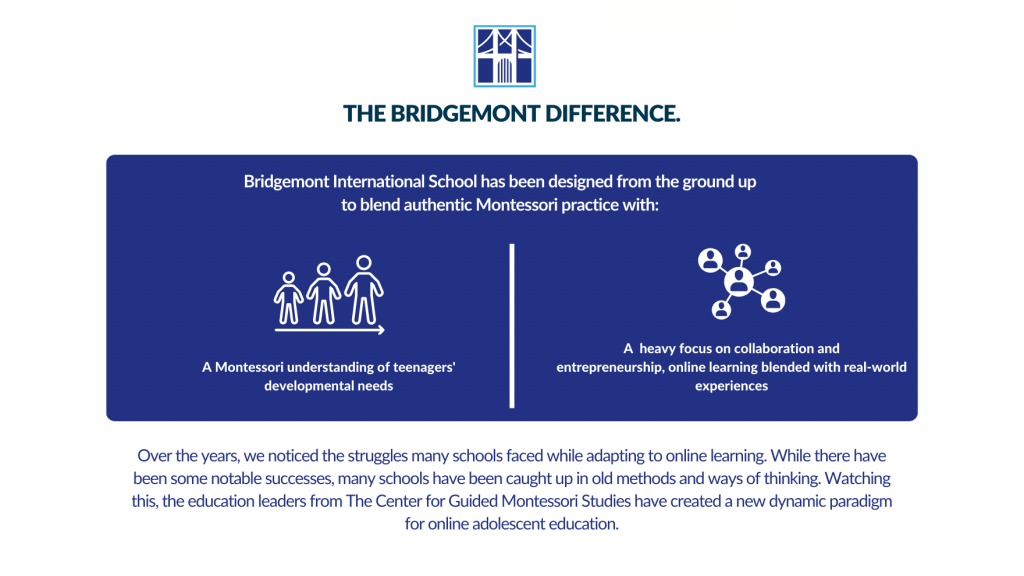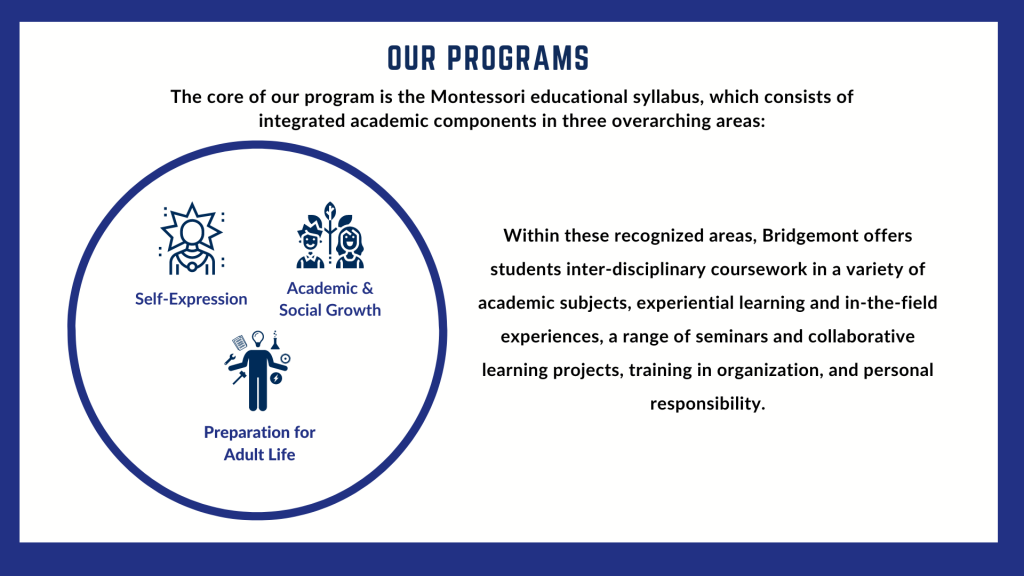Our Vision
Bridgemont envisions a world full of adaptable, innovative, global citizens prepared to lead in an ever-changing world.
Our Mission
Bridgemont’s mission is to fulfill this vision by supporting our students to become engaged and fulfilled citizens through a developmentally appropriate, integrated Montessori curriculum that fosters academic and social growth, self-expression, and preparation for adulthood.

Our students are becoming adaptable, innovative, global citizens capable of leading an ever-changing world because Bridgemont International School is committed to supporting a more fulfilling life today through a developmentally appropriate, integrated Montessori curriculum of:
- Academic & Social Growth (higher order, analytical thinking balanced in social justice & mutual respect)
- Self-Expression (freedom of choice and acceptance leading to love of learning, sense of belonging and authenticity) and
- Preparation for Adult Life (practical life skills in digital citizenship, stewardship, social and economic independence).
“But, above all it is the education of adolescents that is important, because adolescence is the time when the child enters on the state of adulthood and becomes a member of society.”– Dr. Montessori, FCTA, p. 60. Dr. Montessori wisely set forth the unique characteristics and therefore needs of the adolescent plane (7th-12th grades). In that, she did not call for the manipulatives of the younger levels, and she believed that the sensitive period for refining the senses ranged to age 6.
Adaptability: “Adaptability– this is the most essential quality; for the progress of the world is continually opening new careers, and at the same time closing or revolutionizing the traditional types of employment.”– Dr. Montessori, FCTA, p. 61
Montessori Education, at the middle school level, focuses on experiential learning, driven by a student’s innate desire to understand and find their place in the world, and to blossom into global citizens. We encourage them to reach their potential and see a world full of possibilities.
Innovation: “We wish the old things because we cannot understand the new, and we are always seeking after that gorgeousness which belongs to things already on the decline, without recognizing in the humble simplicity of new ideas the germ which shall develop in the future.”
Continually evaluate our curriculum to reflect the needs of our learning community on relevant academic subjects, innovation, collaboration, and team-building skills
Global Citizenship: “Perhaps the failure of the secondary school is due to the fact that it uses methods of assimilation that are no longer suited to the development of the child. The child should no longer be restricted to the environment of the school, to the vaster environment in which he learned and understood the how and the why, nor be so close to the family from which he depends financially; he wants ‘to live’ society.”– Dr. Montessori, COTW, p. 40
An online education has the unique capacity to remove geographic barriers and bring students together in a larger peer group at an age when social growth is critical to development. And many casual conversations in our community begin with local news in a far-away place. Students thrive on connecting with people of other cultures and ideas.
Higher order, analytical thinking: “Here then is the essential principle of education: to teach details is to bring confusion; to establish the relationship between things is to bring knowledge.”– Dr. Montessori, p. 94
Guides promote visible thinking to facilitate deeper analysis of ideas through speaking, writing, drawing, and demonstration. Students are capable of arriving at their own conclusions when given space and support to do so, and in many ways, this is the answer to concerns about technology in education.
Social justice/equity: “If one has really a vision of better conditions, of greater enlightenment of people it is only the child that one can look upon in order to bring about the desired results. If there are people who think that their customs are degenerate, or others who want to revive old ones, the only individual with whom they can work is the child.”– Dr. Montessori, TAM
Adolescents are in a sensitive age for seeking social justice and equity. These concepts are not imposed on them but made tangible as they build respectful relationships with others. Just as experiences in nature build an appreciation and respect for nature, so does genuine connection to people of other cultures and communities expressing opposing schools of thought. Building community that extends far beyond our own hometown builds social justice.
Mutual Respect: “The adolescent must never be treated as a child, for that is a stage of life that he has surpassed. It is better to treat an adolescent as if he had greater value than he actually shows than as if he had less and let him feel that his merits and self-respect are disregarded.”– Dr. Montessori, FCTA, p. 72
Adults are not the keepers of knowledge, but guides who share a journey of discovery. Teachers and students learn from one another. This is the nature of the Montessori student-teacher relationship. We place a priority on kindness and conflict resolution, recognizing that maintaining community requires ongoing community-wide effort.
Self-Expression: “The chief symptom of adolescence is a state of expectation, a tendency towards creative work, and a need for the strengthening of self-confidence.”– Dr. Montessori, FCTA, p. 63
Self-expression is so important to the adolescent curriculum, that Dr. Montessori placed it equal to academics, social growth, and independence. Creativity and expression is infused throughout our curriculum.
Love of learning: “Our care of the child should be governed, not by the desire to make him learn things, but by the endeavor always to keep burning within him that light which is called intelligence.”– Dr. Montessori
Curiosity to learn more comes from being free to explore one’s own interests and means of learning. When the choices are part of a challenging curriculum, those choices foster a feeling of confidence in one’s own readiness, making us the best version of ourselves.
Intrinsic motivation: “Such prizes and punishments are, if I may be allowed the expression, the bench of the soul, the instrument of slavery for the spirit.”– Dr. Montessori, TMM
Deep intrinsic motivation is a trait all humans are born with. We know this because, as Dr. Montessori observed, even small children are driven to learn language and make connections. That innate motivation can diminish over time when young people are rewarded with grades and prizes. While we produce grade reports as an essential practice to prepare young people for their next phases of education and career, we strive to minimize the focus on grades and choose to encourage them through curiosity and joy, fostering a love of learning.
Belonging: “These two needs of the adolescent: for protection during the time of the difficult physical transition, and for an understanding of the society which he is about to enter to play his part as an adult.”– Dr. Montessori, FCTA, p. 60
Young people are forming their adult selves in their adolescent years and often experience insecurity. By encouraging self-expression and sharing ideas through seminars, collaboration, and presentations in a safe community our guides promote a sense of belonging.
Individuality, authenticity: “We cannot make, for instance, a genius, or a general or an artist. We can only help that individual who is to be a general or a leader to realize his potentials.”– Dr. Montessori, TAM
As students seek to better know themselves and define the person they wish to be in adulthood, they will likely explore different habits, clothing, & music. Guides expect this and celebrate students’ uniqueness without judgement.
Digital Citizenship: “Thus, children should learn to use machines habitually as part of their education. The machine is like an extra adaptable limb of modern man; it is the slave of civilization. But beware, for the man of ill-will may be rendered dangerous by machinery; his influence may become unlimited as the speed of communication increases. Therefore a new morality, individual and social, must be our chief consideration for this new world. This morality must give us new ideas about good and evil, and the responsibility towards humanity that individuals incur when they assume powers so much greater than those with which they are naturally endowed.”– Dr. Montessori, FCTA, p. 78
The Montessori curriculum is rich with practical life skills. Digital citizenship needs to be part of that list because over 90% of our young people, even those not participating in digital learning, are online routinely, daily. Skills in digital citizenship connects students to the world safely and responsibly– a practical life skill of this generations’ adolescents.
Stewardship/Sustainability: “We must study the correlation between life and the environment. In nature all is correlated.
This is the purpose of nature. It is a harmony, a plan, a construction.”– Dr. Montessori, 1946LL, p. 98
Ecology is an essential part of the adolescent curriculum. Students learn connections and interdependence of natural resources and how humans can be better stewards of the natural world because what is good for the earth is good for all its inhabitants. Wonder and awe in nature is an essential part of the lesson and best approached by our partnering schools through nature hikes, gardening, and more.
Social Independence: “Independence, in the case of the adolescents, has to be acquired on a different plane, for theirs is the economic independence in the field of society. Here, too, the principle of ‘Help me to do it alone!’ ought to be applied.”– Dr. Montessori, FCTA, p. 67
With increased independence comes greater responsibility. The hallmark of a Montessori education is the cultivation of an independent, thinking human being.
Economic independence: “The essential reform is this: to put the adolescent on the road to achieving economic independence. We might call it a ‘school of experience in the elements of social life.’”- Dr. Montessori, FCTA, p. 64
Young people lead seminars, multi-tiered projects, and committees, and advocate for themselves daily, reaching out to teachers and peers. They experience division of labor and gain skills in economy projects which builds their confidence now and prepares them for the future.
Our Philosophy
We believe these are the essential characteristics of our Secondary Montessori program:

